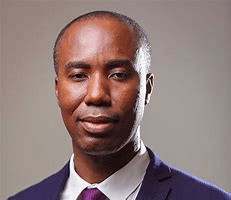Ghana’s national security architecture has come under intense scrutiny following explosive revelations from the Director of Finance at the National Signals Bureau (NSB), confirming what IMANI Africa’s Bright Simons described as a “totally BROKEN” system.
Simons, a well-known advocate for good governance and transparency, used the testimony of Ms. Edith Ruby Opokua Adumuah, Director of Finance at the NSB, to underscore what he sees as a total breakdown in financial and operational oversight within Ghana’s national security framework.
Ms. Adumuah’s courtroom disclosure described how she processed a cheque of GH₵27.1 million on the instruction of former NSB boss Kwabena Adu-Boahene without being privy to the actual destination of the funds.
“I understood the description to refer to an existing operational bank account belonging to the Bureau,” she testified, referring to a payment made to an account labelled “BNC Operations.”
Only later did she discover that the funds had gone to a private entity — “BNC Communication Bureau Limited,” a company controlled by Adu-Boahene and his wife.
According to Simons, this level of laxity is emblematic of systemic rot in Ghana’s national security infrastructure.
“She is the Head of Finance, but she doesn’t have the security clearance to verify documentation and confirm why certain payments are made. Unbelievable! You couldn’t make it up if you tried!”
Bright Simons
He warned that the scale of the fraud described “at the heart of the national security system itself should tell Ghanaians that the country is seriously NAKED.”
Simons emphasized that this is not simply an isolated case of misappropriation but evidence of a larger, structural flaw in how national security is deployed across state functions.
In Ghana, he said, agencies meant for intelligence and counterintelligence are routinely drawn into commercial transactions — some involving vast sums of public money.
He pointed out that many transactions deemed “sensitive” are not vetted by financial experts or auditors, but rather by national security staff with little or no subject matter expertise.
“A lot of the government-driven gold trading currently going on is on the basis of national security clearance,” he stated, noting that some of these arrangements have already resulted in financial losses.
Simons cited past examples, including the Kufuor-era redenomination of the Cedi, where local contractors were handpicked based on “so-called national security clearances.”

In his view, this practice of shrouding procurement and finance in intelligence jargon has created fertile ground for corruption.
“The pretence that a national security bureaucracy riddled with nepotistic hiring and antiquated tools is somehow uniquely suited to perform supposedly ultra-sensitive tasks has become a cover to bypass sensible and standard procedures.”
Bright Simons
This, he added, has fostered a dangerous nexus of collusion between politicians and security operatives.
The result, he said, is “underhanded commercial dealings with a veneer of ‘security and intelligence’… creating overnight multimillionaires.”
National Security’s Weak Controls Undermine Public Trust
Meanwhile, in her sworn testimony, Ms. Adumuah laid bare the consequences of this broken system. She recounted how on February 6, 2020, she was directed by Adu-Boahene to write a cheque for GH₵27.1 million to “BNC Operations.”
“After writing the cheque, I handed it over to A1 [Adu-Boahene] for the necessary signatures. I did not know at the time I wrote the cheque that it would be deposited into an account at UMB Bank belonging to BNC Communication Bureau Limited.”
Ms. Edith Ruby Opokua Adumuah

Her lack of knowledge stemmed from her own security clearance level, which did not allow her to verify or question the destination of such high-value transactions — a revelation that has shocked many observers.
Accordingly, Simons contended that in any country with a functioning system of “national learning,” the Attorney General would have already initiated sweeping reforms of the national security sector based on such disclosures.
However, in Ghana, he lamented, no such reform agenda appears to be underway.
Instead, the revelations risk being buried in bureaucracy, leaving a wide gap in public trust. “This level of crass fraud in the most sophisticated agency of a country’s national security system? Whoa!” he exclaimed.
The broader concern now is whether the executive and Parliament will act decisively to restore integrity to Ghana’s national security complex.

The NSB, as one of three primary intelligence agencies in the country, plays a central role in surveillance, internal threat assessment, and strategic operations — functions that rely heavily on public confidence and professional credibility.
For Simons and others in civil society, the exposure of such blatant financial misconduct should serve as a wake-up call.
The test, however, will be in how swiftly and transparently Ghana’s leadership confronts what has now become a national embarrassment.
As it stands, the NSB scandal continues to unravel, shaking the foundations of institutional trust and raising urgent questions about the accountability of those entrusted with both security and state resources.
READ ALSO: Ukraine Urges Allies To Speed Up Air Defense Systems Delivery



















